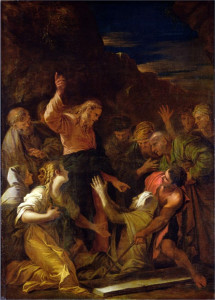40And a leper came to him, imploring him, and kneeling said to him, “If you will, you can make me clean.” 41Moved with pity, he stretched out his hand and touched him and said to him, “I will; be clean.” 42And immediately the leprosy left him, and he was made clean. 43And Jesus sternly charged him and sent him away at once, 44and said to him, “See that you say nothing to anyone, but go, show yourself to the priest and offer for your cleansing what Moses commanded, for a proof to them.” 45But he went out and began to talk freely about it, and to spread the news, so that Jesus could no longer openly enter a town, but was out in desolate places, and people were coming to him from every quarter. (Mark 1:40-15)
 In our study of Mark’s gospel, we’ve seen Jesus preach, heal, liberate from demons and pray. In this passage we see him cleanse.
In our study of Mark’s gospel, we’ve seen Jesus preach, heal, liberate from demons and pray. In this passage we see him cleanse.
See the Leper
And a leper came to him, imploring him, and kneeling said to him, “If you will, you can make me clean.” (v.40)
We need to get familiar with leprosy to understand the significance of this passage. We know his leprosy is advanced because Luke indicates he is “full of leprosy.” His condition likely began with skin irritation, but the swelling and oozing sores may have advanced to the point that his face was hideously disfigured. It may have affected the mucus membrane inside his nose, eventually causing it to collapse, leaving a sunken cavity. It may have caused his eyelids to cease working, leading to optical irritation, damage and even blindness.
The leper’s extremities would have likely lost feeling due to nerve damage. This would have left him without protective pain sensation, causing him to injure his hands, fingers, feet and toes. Even if he hadn’t destroyed his fingers and toes through injury, the disease may have caused deterioration of the cartilage, drawing them inward until they resemble small claws.
Beyond the horrific symptoms, note the sentence he faced once diagnosed:
45“The leprous person who has the disease shall wear torn clothes and let the hair of his head hang loose, and he shall cover his upper lip and cry out, ‘Unclean, unclean.’ 46He shall remain unclean as long as he has the disease. He is unclean. He shall live alone. His dwelling shall be outside the camp. (Leviticus 13:45-46)
Taking all of this into account, we can see that leprosy was more than a disease. It was an identity. This man was not just sick. He was “unclean.”
How would you feel if you were this man? How would you respond if you were approached by this man? Let’s look now at how Jesus responded.
See Jesus
Moved with pity, he stretched out his hand and touched him and said to him, “I will; be clean.” And immediately the leprosy left him, and he was made clean.
Jesus Cares
He was “moved with pity.” The original language is stronger than our idea of pity. He felt pity so intense he was almost indignant with anger. He was not emotionally detached from this man. He was not stoic. He was deeply emotionally connected to this man.
Jesus Touches
You were not supposed to touch a leper! Lepers were unclean. It is said that some would carry rocks to throw at lepers to ensure they kept their distance. Jesus, on the other hand, stretched out his hand and touched him–possibly the first physical contact this man experienced in years. Jesus could have healed him with a word, but chose to touch him.
Jesus Cleanses
Jesus’ healing touch transformed the man instantly from unclean to clean. From ostracism to community. From shame to dignity.
Jesus cares about the unclean. Jesus moves toward, and even touches the unclean. Jesus cleanses the unclean. What a Savior we have! What a Lord we follow! This is amazing! Yet, as amazing as all this is, you may notice that the majority of this passage is not devoted to the cleansing, but to what happens next.
What Happens Next
And Jesus sternly charged him and sent him away at once, and said to him, “See that you say nothing to anyone, but go, show yourself to the priest and offer for your cleansing what Moses commanded, for a proof to them.”
Immediately after dramatically changing this man’s life, Jesus “sternly” charged him to keep quiet about it. The word translated “sternly” indicates growling intensity. Jesus intensely commanded the man to say nothing to anyone. “Yes, go through the religious ritual necessary to prove to the priests that you’re clean so you can go back to your life. But say nothing to anyone else!”
Why? Verse 45 shows what happened when the cleansed man disregarded Jesus’ charge to keep silent:
But he went out and began to talk freely about it, and to spread the news, so that Jesus could no longer openly enter a town, but was out in desolate places, and people were coming to him from every quarter.
The cleansed man disobeyed, and the result is a mega church of sorts. Why did Jesus intensely want to avoid this? By our modern standards, this was a huge success! The news spread. It went viral. Wasn’t this a marketing success? People came to him from every quarter. Wasn’t this a numerical success?
No, because Jesus did not want the news to spread. Nor did not want people coming to him from every quarter. He wanted to “go on to the next towns,” so he could preach there (v.38). He wanted to work his way through the towns of the area proclaiming the fact that the kingdom of God was at hand and that all should repent. He wanted to preach his way to the cross.
His purpose was not the hype. His purpose was not the crowds. His purpose was the cross.
The Cross
The healing, the liberation from demons, the cleansing–these were shadows (Hebrews 8:5). The substance was always the cross. On the cross Jesus expressed his ultimate sympathy for our pitiful condition. On the cross Jesus stretched out his hands and touched our true uncleanness. On the cross Jesus cleansed us from our spiritual leprosy.
For our sake he made him to be sin who knew no sin, so that in him we might become the righteousness of God. (2 Corinthians 2:21)
Discussion Starters
- Read the passage together. What strikes you most about this passage?
- How do you think you would respond if you were approached by a man “full of leprosy?”
- Read verse 41. How does Jesus’ ministry to the leper parallel his ministry to sinners in general? What scriptures come to mind as you think about this question?
- What are the implications of this passage on the way we minister to others as Jesus’ body, the church?
- Read verse 43. Why did Jesus charge the man to “say nothing?”
- Take some time to pray for one another, our church and the “unclean” people in our lives.




